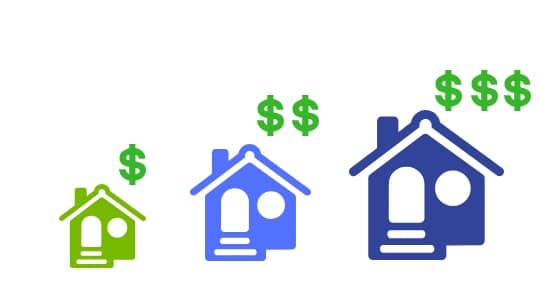1031 Exchange in Real Estate: How to Preserve Wealth and Grow it?
Real Estate has been the favorite recipe for becoming wealthy for most millionaires of the world. Not because real estate delivers promising returns in the long run. But it is the number of tax shelters it offers to the investors. The 1031 exchange is one such strategy in real estate that helps investors to preserve their wealth and defer them from paying enormous taxes on their wealth.
The 1031 Exchange in real estate allows investors to roll on the tax liability into a new like-kind property deferring them from paying taxes on capital gains. You literally can postpone taxes and keep your wealth preserved for the rest of your life with a 1031 Exchange.
Keep reading this article if you are concerned about your wealth being eaten away by the taxes.
What is a 1031 Exchange in Real Estate?
The 1031 Exchange in Real Estate has been taken from the Internal Revenue Code (IRC) Section 1031. Under section 1031, investment property owners are allowed to defer taxes on the proceeds from a sale of the property by reinvesting it into other or more like-kind properties in a certain time frame.
Suppose you have an investment property that you bought at $300,000 and now selling it for $540,000. Technically you have to pay capital gain tax on the proceeds from the sale. That means after the sale of the property, you have a liability of paying a capital gain tax of $240,000.
You can defer this capital gain tax by buying a like priced property and can roll the tax liability into the new property cost basis with a 1031 exchange but in a certain time frame. A Cost Basis is the sum total of the sale proceeds from the primary property and the cash paid from pocket towards buying the other property)
Note: For simple understanding, we have not accounted for acquiring costs, ownership costs and selling costs. To calculate the capital gain tax on the sale of primary property, you need to understand the cost basis of the primary property first.
How Does 1031 Exchange Work in Real Estate?
The IRS has laid down certain rules surrounding the real estate 1031 Exchange. The rules govern guidelines related to
- Whether your property qualifies for a 1031 Exchange or not?
- Like-Kind Exchange
- The time limit of doing a 1031 Exchange.

Does Your Property Qualify for a 1031 Exchange?
You cannot do a 1031 Exchange for just any property you buy, hold and sell. The IRS requires that the property
- Must be a Real Property
- Is purchased with the intent of an investment property or to be used in a business.
- Should not be a primary residence or was acquired for personal use only
- Must be in the US.
- The exchanged property should be like-kind and must not be outside the US.
What is a Like-Kind Property in a 1031 Exchange?
The Like-Kind Requirement in a 1031 real estate exchange meant the exchanged properties must be held for business or investment purposes. It necessarily doesn`t mean the exchanged properties must be of the same size, same type, or the same class.
You can exchange land with an apartment building or vice versa. A single-family rental property with a multifamily property. Residential investment property with a commercial property. Also, you can use the sale proceeds for making improvements in the exchanged property and defer taxes but within the 180 days period.
What is the Time Limit of Doing a 1031 Exchange?
The time limit of doing a 1031 exchange is technically known as a delayed 1031 exchange. As the exchange or swapping of the properties is not happening simultaneously, the taxpayer has a delayed exchange. The IRS has a set limit of 45 days and 180 days in relation to doing a 1031 Exchange.
The 45 Days Time Limit
From the date of sale of the primary property, the taxpayer has 45 days to identify a potential like-kind property. You must document this identification by
- Preparing a Signed Document mentioning the identification of the property clearly with a legal description
- Delivering the Identification Document to the Seller of Replacement Property or to the Intermediary
During the identification period, the taxpayer can identify up to 3 Replacement Properties not concerning their fair market value. This is also known as the 3 Property Rule in a 1031 Exchange. The properties that you identify must not have an aggregate value over 200% of the primary property that is sold.
The 180 Days Period
Before the end of the 180 days after the sale of the primary property, the taxpayer has to acquire the exchange property(s) in order to be eligible for a 1031 exchange. Also, you can include the cost of improvements in the cost basis of the new property which is eligible for deferral if done within the 180 days window.
Can You Do a 1031 Exchange on Your Own?
Before you do a 1031 exchange and relinquish your primary property, you are required to hire a qualified intermediary(QI). As per the IRS, you can’t do a real estate 1031 exchange on your own. The QI will facilitate the process of 1031 Exchange.
The Intermediary can be a company or a person qualified under the provisions of the IRS. These enter into a written agreement with you to facilitate the sale of relinquished property by transferring the property to the buyer. And, then put the proceeds from the sale into a separate escrow account or trust. These QI ensure that you don’t pledge against these sale proceeds until the exchange actually happens.
If these funds are used by you in any way other than buying the replacement property, it will be classified as boots and further treated under the capital gain tax.
In general, the QI must not be related to the taxpayer. And had the taxpayer availed any financial related services in the last two years prior to the closure of the escrow account for the exchange. Then, that person or company does not qualify for an intermediary for the taxpayer 1031 exchange
When You Can’t Do a Real Estate 1031 Exchange?

Your property exchange is not deferred from taxes under the 1031 Exchange if the relinquished property is used for any purpose other than the investment property. Don`t bother yourself wondering for 1031 exchange if the relinquished property is
- Your Residence
- Your Second Home or Vacation Home (Primarily Held For Personal Use Only)
- Primarily Held with Intent of Disposing Of/Flipping Off (Not Held For any Productive Use)
Certain Cases Where You Qualifies For a 1031 Exchange
- 1031 Exchange in Real Estate on Personal Residence
When you have converted your house into a rental after residing in it for a few years. Keep renting your house for at least 2 years at a fair market rent before making an exchange. The IRS guys are smart and you don’t want to end up with any kind of legal scrutiny.
- 1031 Exchange in Real Estate on Second Home or Vacation Homes
Your Vacation home or second home can qualify for a 1031 exchange if you meet the threshold of owning it for more than 24 months before the exchange. And rented the property for more than 14 days in a year at a fair market price. Also, you haven’t used the property for self-use for greater than 14 days or 10 percent of the number of days the property was rented for.
Do You Qualify For 1031 Exchange If You are a Live-in Landlord?
A live-in landlord can enjoy the tax deferral benefits under section 1031 in real estate if you have a multi-family property. Though the exchange will not be completely tax-deferred and will be treated under a split transaction. The portions/ units in the property which are rented are eligible for the benefits under section 1031. The unit that you have occupied is eligible for tax exemption under section 121.
Under section 121, if you choose to sell your primary residence after holding it for 5 years, the IRS has a provision that lets you exclude some of the capital gain taxes. As per section 121, a tax exemption on gains worth $250,000 for a single individual or $500,000 for a married couple filing jointly is applicable. The only condition is you must live in the property for at least an aggregate of 2 years out of the 5 years.
Can You Live In Your 1031 Exchanged Property?

The IRS takes into consideration that circumstances do not always remain the same, so does the nature of the property. You can live in a 1031 exchange property and still continue to enjoy the benefits of tax deferral. The only condition is to hold the replacement property for no less than 5 years before you can sell it. If you choose to sell before 5 years, you have to pay capital taxes on the sale.
The second thing in this regard is that you should not immediately move into this property after the exchange. Have a safe harbor for renting this property for at least a year before you move in. The IRS wants your intent towards property exchange as an investment if you wish to enjoy tax deferral benefits under section 1031.
Note: One thing to keep in mind is if you choose to sell the 1031 exchange property that you eventually moved into. Section 121 allows you to exclude some capital gain taxes but the depreciation recapture tax will still be applicable if you have taken the depreciation tax benefits.
Can You Do a 1031 Real Estate Exchange With Family Members?
The IRS has stringent rules and is very cautious about tax evasion. If you do 1031 exchange within the family or with someone related. Both you and the related party are required to hold the property for no less than 2 years from the date of the exchange. Any exchange done for the purpose of shift basis will be scrutinized.
Also, there are still some exceptions to this rule. You or the related member are not required to hold the property if in case
- Death of any Party
- The taxpayer can prove the exchange is not for shift basis and avoidance of tax
- Involuntary or Compulsory Conversion of one of the properties under the IRC section 1033
Note: A related party can be a family member, or any kind of entity, corporation, and partnership in which you hold 50% interest in the capital.
How Much Do You Have To Reinvest in 1031 Exchange?

The complete proceeds from the sale of the relinquished property have to be reinvested to enjoy the complete tax deferral benefits under section 1031. What it means is you must purchase the replacement property for at least the amount of net sale minus any property acquisition costs.
As said before, any proceeds from the sale which isn`t reinvested in the purchase are known as boot. And the boot is liable under capital tax gain. Also, if you use any proceeds from the sale to pay off the mortgage on the relinquished property, it will also be classified under boot, or the debt reduction boot.
Suppose you are disposing of your primary property for $750,000 which still has a $200,000 mortgage on it. A debt reduction boot will come into play if you use $200,000 out of $750,000 from the sale to pay off the existing mortgage. In this case, the $200,000 will be considered a realized gain and hence will be treated under the capital gain tax. Else take out a new mortgage or come up with cash from your pocket to buy that exchange property.
Is Partial 1031 Exchange in Real Estate also Possible?
Though you have to reinvest 100% of the proceeds from the sale to enjoy complete tax deferral benefits under section 1031. But this is not everything or nothing. You can defer most capital taxes if not all by doing a partial 1031 exchange. The only thing is the amount that is reinvested is only eligible for tax deferral under section 1031 and remaining will be taxed under capital gain tax. So, with partial 1031 exchanges, you can pull out some money from relinquished property if required.
What Happens If the 1031 Exchange is Delayed or Failed Completely?
Delayed 1031 Exchange After The Financial Year
The Sale of Relinquished property and acquisition of the exchange property does not happen in the same financial year. For instance, you sold your relinquished property in December 2020 and acquired the replacement property in May 2021. The exchanged property is acquired in the following financial year and not in the current financial year though it is acquired well within 180 days. So, is the 1031 exchange still valid?
Remember, the IRS requires you to complete the 1031 exchange within 180 days or before the end of the tax filing. But, In this case, the 1031 exchange is delayed and not completed before the filing of taxes. The individual then has to file for an extension by submitting the form 4868. The form only gives you on the extension of filing and not for the 1031 exchange. The exchange property must be acquired well within 180 days.
Failed 1031 Exchange
A Failed 1031 Exchange means that you aren’t able to identify and acquire the replacement property within the time limit. Something went wrong. You couldn`t be able to acquire the exchange property due to its unavailability or some kind of defect.
All in all, you sold the relinquished property, the 180 days limit has been passed and the exchange did not happen. In such a case, you will have a capital gain tax liability on the proceeds from the sale. You can’t carry this forward for the following year.
When Should You Consider Doing a 1031 Exchange?

Apart from the income, there are a lot of other benefits available for real estate investors. Real Estate has the real word in it because no other asset class can match the benefits it provides to the investors. With real estate investments, you are allowed to have enormous tax benefits and the 1031 exchange is like the cherry on the cake. In certain circumstances, a 1031 exchange can be a perfect savior and you should definitely consider it.
- 1031 Exchange to Dispose of a Non-Performing Asset
You may be holding a non-performing asset. It is not a surprise to occur to negative cash flowing property due to changed circumstances. Doing a 1031 Exchange, you can sell that non-performing asset and exchange it with more profitable investment property/ properties without the need to pay taxes on that sale.
- 1031 Exchange to Preserve Equity
Selling an investment property can be a costly event tax-wise especially if you are selling at exorbitant profits on the purchase price. An average taxpayer pays 25% – 40% of his profits back to the government in form of taxes. However, a 1031 exchange helps you keep all the gains and preserve your equity until you keep swapping before finally disposing of it.
- 1031 Exchange To Avoid Depreciation Recapture
A taxpayer has to pay 25% tax on Depreciation Recapture during the sale of the property. However, you can defer the tax by doing a 1031 exchange. Suppose you sold a property for $540,000 that you bought 20 years ago at $300,000 and also took $262,500 in depreciation over these years. The event of this sale would require you to pay $60,000 in taxes. By doing a 1031 exchange you can roll on this tax liability in the new cost basis of the property.
- 1031 Exchange For Estate Planning
Imagine you have to equally distribute your apartment building to 2 of your legal heirs. And one of them is not interested in managing this property of yours. You can do a 1031 exchange. Sell this property and exchange it with multiple properties and hand over the estate accordingly to avoid feuds in the family.
Also, after your death, your heirs will receive a step-up basis on the property according to its present value and all the gains you have assumed in these properties will disappear.
The Bottom Line
You can generate enormous wealth by investing in real estate. But, preserving this wealth for lifetime and passing it to your next generation is quite a trick. The 1031 Exchange is the perfect tool in your arsenal for this case.
However, you should be careful with the exchange rules and not abuse it. The exchange process is simple, but individual situations can add to the complexity. It is advised that you always hire an efficient qualified intermediary to execute the process.
Considering doing a 1031 Exchange? How do you find the information above? Do let us know in the comments section below. And if you like the information, you may be want to subscribe to our weekly newsletter where we come up with lots of information for landlords and real estate investors. You can also become a part of our community on Facebook.


